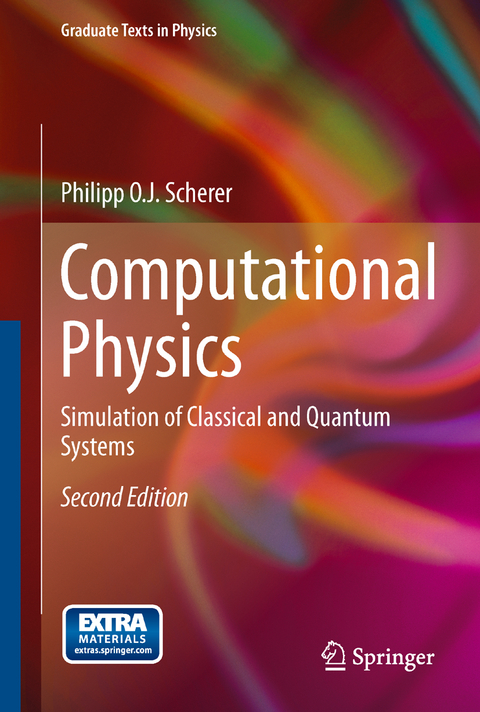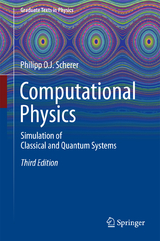Computational Physics
Springer International Publishing (Verlag)
978-3-319-00400-6 (ISBN)
This textbook presents basic and advanced computational physics in a very didactic style. It contains very-well-presented and simple mathematical descriptions of many of the most important algorithms used in computational physics.
The first part of the book discusses the basic numerical methods. The second part concentrates on simulation of classical and quantum systems. Several classes of integration methods are discussed including not only the standard Euler and Runge Kutta method but also multi-step methods and the class of Verlet methods, which is introduced by studying the motion in Liouville space. A general chapter on the numerical treatment of differential equations provides methods of finite differences, finite volumes, finite elements and boundary elements together with spectral methods and weighted residual based methods.
The book gives simple but non trivial examples from a broad range of physical topics trying to give the reader insight into notonly the numerical treatment but also simulated problems. Different methods are compared with regard to their stability and efficiency. The exercises in the book are realised as computer experiments.
Prof. Scherer received his PhD in experimental and theoretical physics in 1984. He habilitated in theoretical physics and has been a lecturer at the Technical University of Munich (TUM) since 1999. He joined the National Institute of Advanced Industrial Science and Technology (AIST) in Tsukuba, Japan, as a visiting scientist in 2001 and 2003. From 2006 to 2008 he has been temporary leader of the Institute for Theoretical Biomolecular Physics at TUM. Ever since he has been an adjunct professor at the physics faculty of TUM. His area of research includes biomolecular physics and the computer simulation of molecular systems with classical and quantum methods. He published books on theoretical molecular physics and computational physics.
Part I Numerical Methods.- Error Analysis.- Interpolation.- Numerical Differentiation.- Numerical Integration.- Systems of Inhomogeneous Linear Equations.- Roots and Extremal Points.- Fourier Transformation.- Random Numbers and Monte-Carlo Methods.- Eigenvalue Problems.- Data Fitting.- Discretization of Differential Equations.- Equations of Motion.- Part II Simulation of Classical and Quantum Systems.- Rotational Motion.- Molecular Dynamics.- Thermodynamic Systems.- Random Walk and Brownian Motion.- Electrostatics.- Waves.- Diffusion.- Nonlinear Systems.- Simple Quantum Systems.
From the book reviews:
"The well-written monograph about computational physics is based on two-semester lecture courses given by the author on a period of several years for undergraduate physics and biophysics students ... . convenient for students and practitioners of computer science, chemistry, and mathematics who are interested in applications of numerical methods in physics and engineering sciences. ... well-organized book with a concentration to the important ideas of the methods and physical applications including software, examples, illustrations, and references to further reading." (Georg Hebermehl, zbMATH, Vol. 1303, 2015)| Erscheint lt. Verlag | 30.7.2013 |
|---|---|
| Reihe/Serie | Graduate Texts in Physics |
| Zusatzinfo | XVIII, 454 p. |
| Verlagsort | Cham |
| Sprache | englisch |
| Maße | 155 x 235 mm |
| Gewicht | 866 g |
| Themenwelt | Mathematik / Informatik ► Mathematik ► Angewandte Mathematik |
| Naturwissenschaften ► Chemie ► Physikalische Chemie | |
| Naturwissenschaften ► Physik / Astronomie ► Allgemeines / Lexika | |
| Naturwissenschaften ► Physik / Astronomie ► Theoretische Physik | |
| Schlagworte | Error Analysis • Explains Computer Simulation • Fourier Transformation • Inhomogeneous Linear Equations • molecular dynamics • Monte-Carlo Methods • Simulation of Classical and Quantum Systems • Teaches Simulation Methods • Textbook on computational physics • Textbook on Numerical Methods |
| ISBN-10 | 3-319-00400-X / 331900400X |
| ISBN-13 | 978-3-319-00400-6 / 9783319004006 |
| Zustand | Neuware |
| Informationen gemäß Produktsicherheitsverordnung (GPSR) | |
| Haben Sie eine Frage zum Produkt? |
aus dem Bereich





